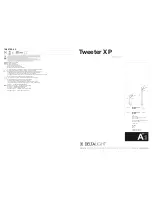
Outdoor Electric Patio Heater Model No. EWTR800SP
Contact 1.800.762.1142 for assistance. Do not return to place of purchase.
page no.
5
NOTE: Heater functions best WITHOUT an extension cord.
If an extension cord is necessary:
• Use a UL approved, 3 prong plug (grounded) cord shall be no. 16 AWG minimum size
and rated not less than 1500 watts.
• Never connect two or more extension cords together.
• Use the shortest extension cord possible.
• Keep connections dry and off the ground.
• Avoid draping the electric heater cord where children or animals could encounter it.
Before Turning “ON”
1. Make sure all labels, packaging and protective films have been removed from the heater.
2. Heater should be thoroughly inspected before each use, and by a qualified service person at
least annually.
Turning “ON”
1. Plug the power cord into a dry GFI (Ground Fault
Interrupter) 3 plug outlet. (Illustration 1)
2. Push the power button. (Illustration 2)
Note
: The red LED light will glow while the heater
is on.
Note:
When restarting the heating element will start up
slowly before getting to full power.
While Heater is “ON”
If heater tips over, the heater will automatically
turn “OFF”.
If heater tips over:
1. IMMEDIATLEY unplug power cord from the wall outlet.
2. Carefully turn the heater upright.
CAUTION: Dome, pole and shroud cover may
be hot. Use heat resistant gloves to set heater
upright.
3. Inspect heater to ensure no damage.
If no damage continue to next step.
If there is damage call a qualified technician to inspect
and make any necessary repairs.
Do NOT use the heater if there is any sign of
damage. A qualified technician should inspect
and make any nescessary repairs before the
heater is used again.
4. Plug the power cord into a dry GFI (Ground Fault Interrupter) 3 plug outlet. (Illustration 1)
5. Push the power button. (Illustration 2)
Note
: The red LED light will glow while the heater is on.
Note:
When restarting the heating element will start up slowly before getting to full power.
Turning “OFF”
1. Push the power button. (Illustration 2)
2. Unplug the power cord from the wall outlet.
Cleaning and Care
Notices
1. Abrasive cleaners will damage this product.
2. Never use oven cleaner to clean any part of heater.
3. Do not clean any heater part in a self cleaning oven. The extreme heat will damage
the finish.
4. Inspect heater before each use.
5. Have heater inspected annually and repairs should be made by a qualified service
person.
6. Do not clean heater with combustible or corrosive cleaners. Use warm, soapy water.
7. Do not paint engine, engine panels or dome.
8. This heater should be thoroughly cleaned on a regular basis.
9. After a period of storage and/or non use, inspect for any abrasion, wear or cuts to the
power cord.
Operating Instructions
Cleaning and Care (continued)
Cleaning Surfaces
1. Wipe surfaces clean with a solution of water and mild dishwashing detergent or baking
soda.
2. Wipe clean with damp cloth.
Note: While cleaning your unit, be sure to keep the area around the heating element dry at all
times. Do not submerge the heating element. If the heating element is submerged in water, do
NOT use it. It must be replaced.
Maintenance
To enjoy years of outstanding performance from
your heater, make sure you perform the following
maintenance activities on a regular basis:
1. Keep exterior surfaces clean.
2. Air flow must be unobstructed. Keep circulating air
passages around the heating element clean.
Replacing the Fuse
1. Push the power button. (Illustration 2)
2. Unplug the power cord from the wall outlet.
3. Using a screwdriver, remove the fuse cover.
(Illustration 4)
4. Carefully remove the old fuse, and replace with the
new fuse. (Illustration 5)
Note: ONLY replace the old fuse with a
250V 15A fuse.
5. Reattach the fuse cover.
Note: Do not over tighten
6. Follow the Turning “ON” instructions or the Storage
Instructions.
Storage
Between Uses and During Periods of Extended Inactivity or
When Transporting:
1. Push the power button. (Illustration 2)
2. Unplug the power cord from the wall outlet.
3. Store heater upright in an area sheltered from direct contact with inclement weather (such
as rain, sleet, hail, snow, dust and debris).
4. If desired, cover heater to protect exterior surfaces and to help prevent build up in air
passages.
Wait until heater is cool before covering.
Illustration 1
Metal Screw
Connecting the power cord to a
dry GFI 3 plug outlet.
Illustration 2
Power button
Illustration 4
Remove fuse cover
Illustration 5
Remove old fuse


























